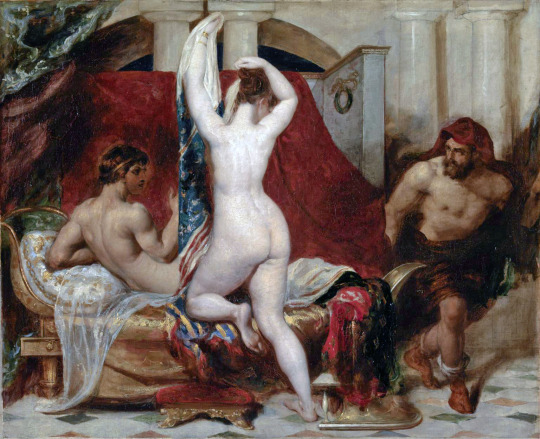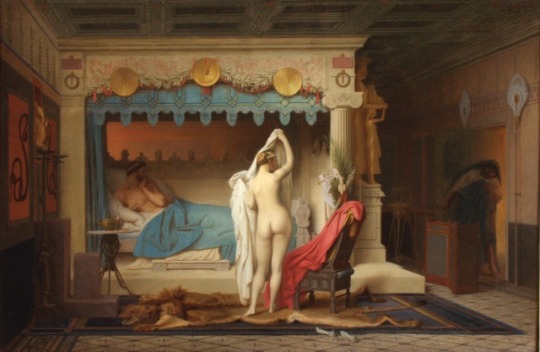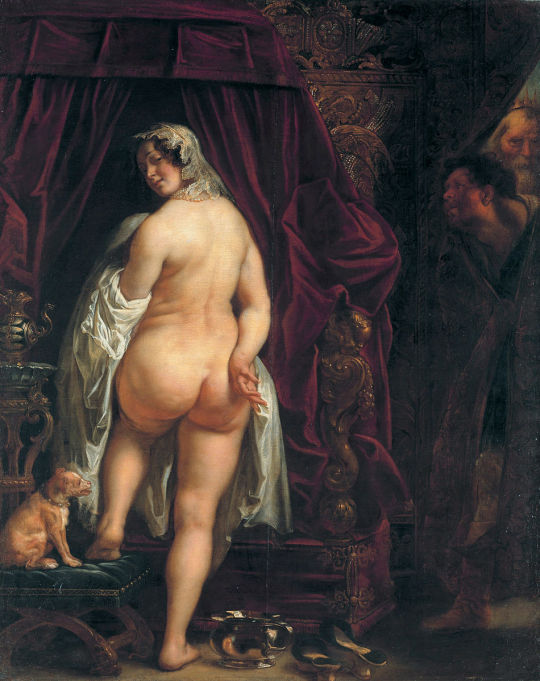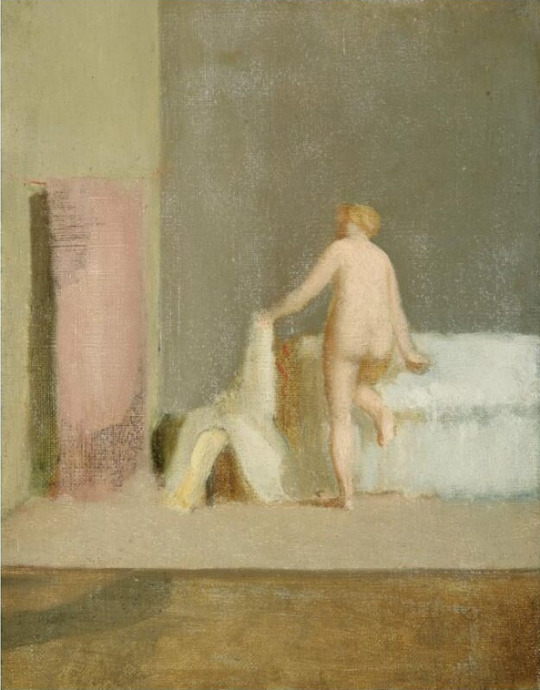#Shews his Wife by stealth to Gyges (1820)
Text

13 notes
·
View notes
Text
Gyges: a story of love and magic rings
A story that Game Of Thrones' George R. R. Martin and Lord Of The Rings' J. R. R. Tolkien would be jealous of.

Candaules, King of Lydia, Shews his Wife by Stealth to Gyges by William Etty, 1820, Tate, London (photo by picturesinpowell.com)

King Candaules by Jean-Leon Gerome, 1859, Museum of Art on Ponce (photo by picturesinpowell.com)

King Candaules of Lydia showing his wife to Gyges by Jacob Jordaens, 1646, National Museum, Stockholm (photo by picturesinpowell.com)

Candaules’ Wife by Edgar Degas, c 1855-56, private collection (photo by perlegonetwork.com)
The story of Gyges comes in 2 versions:
1. Herodotus' version aka the Game Of Thrones version
Herodotus in his work Historiae tries to explain the hostility between Greeks and non-Greeks (commonly known in antiquity as barbarians). Their rivarly escalates in the Persian Wars during the 5th century BC, but Herodotus goes a lot back in time in order to find the true cause of the hatred.
So, we're in the 7th century BC in the kingdom of Lydia, which is the modern Asia Minor. Lydians co-exist with the greek cities and everything's fine. However, Candaules, king of Lydia, falls madly in love... with his wife. You might wonder and? He didn't do anything illegal after all, it's his wife, man. But he falls in love in a creepy way; he's so excited with her beauty that he wants to show his wife *nude* to his friend, Gyges, who's a soldier in the king's service, in order to convince him for her beauty. Gyges is like: "There's no need, man, I believe you". Kandaules insists and Gyges cannot disobey an order from his king.
So, the same night, Gyges hides in the royal bedroom. The Queen (whose name isn't revealed, maybe because Herodotus couldn't find it out) walks towards the bed to meet her husband and gets undressed in the way. After Gyges sees her nudity, he secretly leaves the room as it was agreed, but the Queen notices him with the corner of her eye. The smart Queen decides to pretend she has no idea and take revenge later.
The next day, the Queen calls Gyges to her room and tells him she knows it all. As you can imagine, Gyges goes pale with fear. The Queen (unlike Candaules who gave him no choice) gives him two choices: either she'll kill him either he'll kill Candaules and marry her. Only one man can see the Queen nude and he must be the King. Gyges complains and begs her not to make him choose. Nonetheless, the Queen is resolved. Gyges cowardly selects to kill Candaules to save his life. Following the Queen's instructions, Gyges hides in the same spot as before in the royal bedroom. As Candaules sleeps naked, Gyges stabs him.
The Lydian people didn't accept so easily the change of the dynasties. However, the Delphi Oracle ensured Gyge's reign saying that only the 5th descedant of Gyges would be damned. So, Gyges married the Queen and reigned as the King of Lydia.
Isn't that a game of thrones plot? Sex, murders and nude scenes, all for the throne.

You might wonder what the heck this has to do with the rivarly between Greeks and the barbarians? Well, the 5th descedant is meant to be the last Lydian King, as his kingdom will be conquered by the Persians who will cause problems to the greek cities. Note that this is more of a myth and of course it can't stand as a logical explanation of the Persian Wars, but the conquest of Lydia by the Persians is historically accurate.
Plato's version aka Lord Of The Rings version
Plato tells the story of Gyges in the second book of his work Republic. Socrates has met up with his friends and pupils and they discuss the matter of justice. As usually in Plato's works, they try to define the matter discussed and give arguments, some of which are myths. All the speakers say their opinion, but Socrates points out their mistakes and with his help they reach to a universal truth that's closely connected with virtue (=the moraly good).
Glaucus, one of Socrate's pupils, argues that justice is impossed on people and they aren't just with their will, because if they're given the choice, they'll become unjust. The only reason they have agreed on justice is for the fear they'll be wronged. It's sad to be wronged, but it's amusing to wrong others. Even the one who seems just, should he be given the chance, he'll become unjust.
That's what Gyges did. In Glaucus' version, Gyges was a humble shepherd. He was tending his flot, when an earthquake occured that split the ground in two. Curious, Gyges went down the gap to find a bronze horse, inside of which lied a very tall corpse of a man. The man wore a golden ring on his finger and Gyges took it. He then went to a shepherds meeting where they'd decide the messengers they would sent to the king to announce him the status of the flocks. Playing with the ring on his finger, he realized that if he adjusted it, he could become invisible! Without second thought, after managing to be one of the messengers, Gyges seduced the queen and killed the king with her help, taking the reign for himself.
Glaukos' conclusion is that anyone would become unjust on condition he wouldn't be caught. For example, if you found a ring that turned you invisible wouldn't you be tempted to steal that lotr merch that costs 50 euros?
Socrates' answer comes in the 10th book. Gyges is actually driven by his impulses and he's therefore unfree and unhappy. On the contrary, the man who wouldn't use the ring for those purposes, is in harmony with himself, as it isn't the punishment that stops him, but his conscience. The one who lives in accordance with his conscience, the moraly right, is happy. So, Gyges is only happy on the surface because of his immorality.
Certainly, this story about a magic ring that grants you invisibility and makes you unjust reminds you of something... How about a ring forged by an evil spirit that turns the wearer invisible and gives him great power in exchange of his free will and final destruction? Is Gyges the Smeagol before Smeagol?!

While there's no evidence that Tolkien had actually read Plato's Ring Of Gyges, the story of Gyge's ring passes to another fictional work which was definitely known to Tolkien; Richard Wagner's opera Der Ring Des Nibelungen (The Ring Of The Nibelunken). In this opera tetralogy, a magic ring forged with stolen gold from the Rhine river by dwarf Alberich has the ability to make the wearer all-powerful. The king of the gods, Wotan, steals it, but has to return it until his mortal grandson, Siegfried, finds it. Nevertheless, Siegfried is cheated and slained for it. The ring finally arrives at the hands of Brünnhilde, a Valkyrie and Siegfried’s lover, the only one who has the prudence to return it to the Rhinemaides. As in lotr, the ring proves to be fatal to anyone who wants to benefit from his power. Similarly, Gyge's ring was equally destructive, as he had an immoral and therefore unhappy life, while it eventually lead to the fall of his dynasty (cf. Delphi's oracle).
I'd like to close with a poem by the 7th century BC poet, Archilochus, who seems indifferent to anything materialistic and immoral, knowing that it's in vain:
οὔ μοι τὰ Γύγεω τοῦ πολυχρύσου μέλει,
οὐδ' εἶλέ πώ με ζῆλος, οὐδ' ἀγαίομαι
θεῶν ἔργα, μεγάλης δ'οὐκ ἐρέω τυραννίδος·
ἀπόπροθεν γάρ ἐστιν ὀφθαλμῶν ἐμῶν.
I care not for the wealth of golden Gyges,
nor ever have envied him; I am not jealous
of the works of Gods, and I have no desire for lofty despotism;
for such things are far beyond my ken.
(Translation by perseus.tufts.edu.com)
A few words for the paintings
1. Etty's composition is well-balanced, putting the woman between the two men who will quickly come into conflict. Playing with a neoclassical subject, Etty puts Candaules in a pose that resembles the classical statues, but, instead of a moral point of view, he doesn't hesitate to depict the erotic element and the vengeance.
Source: tate.org.uk
2. Unlike Etty, Gerome stays faithful to the neoclassical movement and offers a detached perspective of the erotic element by focusing on the architectural and decorative details. I love how this painting captures the Queen noticing Gyges a moment before he disappears through the door.
Source: daheshmuseum.org
3. In Jordaen's painting there are many "modern" elements, not ancient whatsoever. The contrast between light and shade adds to the drama of the scene, while the exact depiction of the different textures (e.g. the curtain) makes it more realistic. It's also interesting to observe the Queen's playful facial expression and how much her body is exposed.
4. While there's no reference of Gyges' myth, Degas' painting is the most voyeristic one. Degas puts the viewer directly into Gyge's position making him think that he watches something forbidden through the key-hole. Despite its minimalistic depiction, there's no more accurate depiction of Gyge's feeling.
#game of thrones#got#lord of the rings#lotr#art history#art#myth#greek mythology#mythology#gyges#kandaules#gyge's ring#herodotus#plato#ancient greek#ancient greece#archilochus#edgar degas#william etty#jacob jordaens#jean leon gerome#jrr tolkien#george rr martin#the ring of the nibelung#wagner#der ring des nibelungen#ring#you win or you die#my precious
39 notes
·
View notes